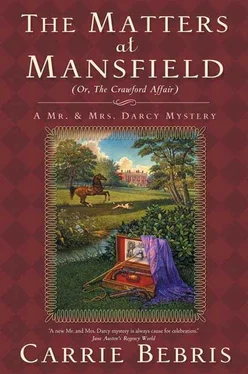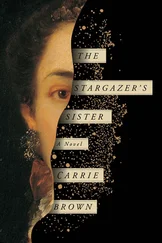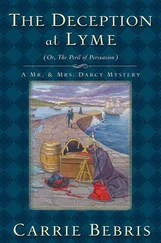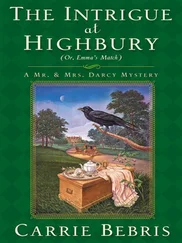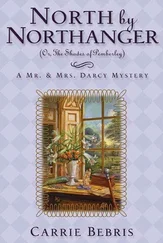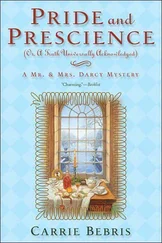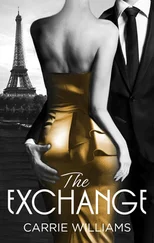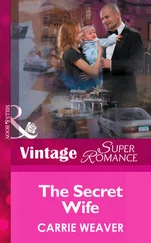Anne raised her eyes and nodded.
Elizabeth responded frankly, and asked Anne some equally frank questions in return. She wished Mrs. Godwin, her midwife, were in Mansfield to consult, but she was able to offer Anne some reassurance: Though only time would reveal her state with certainty, none of what Anne told her corresponded to her own experience.
They had nearly reached the inn, and Anne looked toward the waiting carriage. The viscount, his cane in one hand, his chess case in the other, wandered about the courtyard. The once-proud figure was nearly swallowed by the loose folds of his greatcoat. He created an almost endearing image — but endearing in a grandfatherly, not matrimonial, way.
Anne turned to Elizabeth. “Will you come stand by me now?”
Darcy returned to Number 89 Fleet Street precisely on time. Yesterday, the younger H. W. Mortimer had identified the pistol as having been made a score or more years ago, and asked for a day to review his father’s older records. Darcy hoped the gunsmith had found what he sought. He was anxious to finish his errand and commence his journey north. He was also anxious to regain possession of the pistol, which he had felt uneasy leaving behind. If there were anybody in London, however, with whom he was comfortable leaving the weapon, it was the family of artisans who had crafted it.
Mr. Mortimer greeted him warmly. “I found the record. Though I was but a boy when my father made this set, I thought I remembered it, for it was an unusual one, but I wanted to be certain.” He showed Darcy the description. “My father made this pistol thirty years ago as part of a quad set of duelers — two primary pistols, and two second-sized pistols, all in a single case. This pistol is one of the smaller; the larger guns have eight-inch barrels. All four bear the rifling you enquired about, and all four have a rook image engraved into their locks, hammers, and escutcheons. The description also notes a rook on the case lid.”
“On the case lid?” Darcy repeated.
“Indeed — there is a small illustration.” The renowned gunsmith showed the record to Darcy, then pointed to the name of the purchaser. But he need not have bothered.
Darcy already knew.
“Lord Sennex?”
The viscount broke off from his reverie and offered them a gentle smile. “Mrs. Crawford! Mrs. Darcy! Are you ready to depart?”
“I hoped we might have a word with you first,” Anne said. “A private word?”
“Of course.” He drew his brows together. “But will we not have ample opportunity for conversation in the carriage?”
“I beg your indulgence. Shall we step over here?”
They moved to an area on one side of the inn where a tall hedge shielded them from the view of employees and passers-by. Elizabeth offered to carry the chess set for him, so that he might better handle his cane, but he politely declined.
“Now, what have you to say, my dear lady?”
Anne glanced at Elizabeth and took a deep breath. “I am afraid, my lord, that I cannot marry you.”
Lord Sennex blinked. “I do not understand.”
“I cannot marry you. I believe that a marriage between us, particularly one entered into in such a hasty manner, can only lead to unhappiness. I beg your forgiveness…”
“But—” He looked like a confused child. “We have an agreement. I saw you sign it yester eve — I am certain I did.”
“I did, my lord. And, again, I am deeply sorry. But I must break our engagement.”
Lord Sennex stared at her in befuddlement. “I must have misheard you.”
“No, my lord—”
“Yes, yes — that must be the case. For I have something, you see, something certain to change your mind—” He allowed his cane to fall to the ground so that he could reach into an inner fold of his greatcoat. “Ah, yes — here it is.” He withdrew his hand.
It held a pistol, which he cocked and aimed at Anne.
“Now, my dear… would you care to reconsider?”
“A man in distressed circumstances has not time for all those elegant decorums which other people may observe.”
—
Elizabeth, Pride and Prejudice
Darcy did not notice the approaching sunset as he rode into Mansfield. His mind was too preoccupied with the need to lay eyes on Elizabeth. Once he ascertained her whereabouts and safety, he would go to Mansfield Park to tell Sir Thomas that Lord Sennex was their man.
A gnawing fear had seized him the entire distance from London to Buckinghamshire. He had received her note, informing him of her travel plans, just before leaving town, and had prayed that the viscount’s murderous inclinations did not include ladies.
When he had arrived at Hawthorn Manor and been told that the viscount’s carriage had never appeared as expected, and when a stop at Riveton had also yielded no Elizabeth or Anne, the fear turned to dread. All the way to Mansfield village, he hoped that their travel plans had merely been delayed, that he would walk into the Ox and Bull to find Elizabeth and Anne at supper in the dining room. Instead, he discovered only Colonel Fitzwilliam.
“Please tell me that Elizabeth and Anne are still here.”
Colonel Fitzwilliam regarded Darcy with a mixture of surprise and alarm. “They are not — they went to Buckinghamshire this morning. Why do you appear here in such a state of apprehension?”
“I have just come from Hawthorn Manor. The viscount and his carriage never arrived. I rode straight there from London — after Mr. Mortimer told me that Lord Sennex owns a quad set of dueling pistols with rook engravings and French rifling.”
Colonel Fitzwilliam leapt to his feet. “They departed some ten hours ago. He could have taken them anywhere.”
Elizabeth studied Lord Sennex as the carriage jostled its way north, still stunned that she had so utterly underestimated the crafty old man. Upon drawing his pistol, he had rapidly proved himself in full possession of his faculties.
“Perhaps, Mrs. Crawford, you simply prefer your weddings over the anvil?” he had said. “Very well. Anything to accommodate my bride.”
Walking easily without the discarded cane, he had commanded the two shocked ladies into his carriage under threat of harm if they called attention to themselves. His manservant, a tall, dark, wiry fellow, waited within, his forbidding countenance an effective mute to any impulse they might have felt to cry out.
Once outside the village proper, he had informed the postilion of their new destination. Then he had handed his pistol to his servant and opened the chess case — or what Elizabeth had presumed to be the case for his chess set. It instead was a large gun case with molded compartments for four pistols — two large and two small — and various items Elizabeth took for loading equipment and other accessories. The two small pistol compartments were empty. One of those pistols was now in the servant’s hand.
The other was in Darcy’s — so far distant that he might as well be in Antigua.
Lord Sennex removed one of the larger pistols. Noting Elizabeth’s observation, he spoke. “Yes, it is loaded, if you are wondering. They all are — Mr. Lautus might have been an incompetent fool, but it was good of him to leave my second set of loading materials behind in his room at the inn. Else I would have had no bullets for the smaller pistol, and it is such a convenient size for carrying on one’s person.”
Elizabeth found his refined manner more menacing than would have been open threats.
“I suppose I should be equally grateful to that odious Mrs. Norris for discarding the pistol while I happened to be nearby,” he continued, “though how she came by it after Lautus managed to get himself killed, I still have not determined.”
Читать дальше
